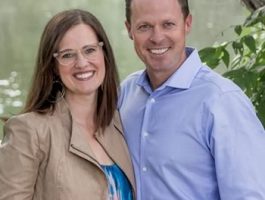
Complex World, Complex Answers
Dennis and Barbara Rainey team up with David Robbins, president of FamilyLife, and his wife, Meg, to answer more tough questions from listeners such as: How do I introduce technology to my kids? What should I say to my adopted kids? What does a grandmother do when she doesn't agree with how her grandkids are being raised?
Show Notes
About the Host
About the Guest
-
Dennis and Barbara Rainey team up with David Robbins, president of FamilyLife, and his wife, Meg, to answer more tough questions from listeners such as: How do I introduce technology to my kids? What should I say to my adopted kids? What does a grandmother do when she doesn't agree with how her grandkids are being raised?
-
Dave and Ann Wilson
Dave and Ann Wilson are hosts of FamilyLife Today®, FamilyLife’s nationally-syndicated radio program. Dave and Ann have been married for more than 38 years and have spent the last 33 teaching and mentoring couples and parents across the country. They have been featured speakers at FamilyLife’s Weekend to Remember® marriage getaway since 1993 and have also hosted their own marriage conferences across the country. Cofounders of Kensington Church—a national, multicampus church that hosts more than 14,000 visitors every weekend—the Wilsons are the creative force behind DVD teaching series Rock Your Marriage and The Survival Guide To Parenting, as well as authors of the recently released book Vertical Marriage (Zondervan, 2019). Dave is a graduate of the International School of Theology, where he received a Master of Divinity degree. A Ball State University Hall of Fame quarterback, Dave served the Detroit Lions as chaplain for 33 years. Ann attended the University of Kentucky. She has been active alongside Dave in ministry as a speaker, writer, small-group leader, and mentor to countless wives of professional athletes. The Wilsons live in the Detroit area. They have three grown sons, CJ, Austin, and Cody, three daughters-in-law, and a growing number of grandchildren.
-

David and Meg Robbins
As 17-year veterans of Cru, David and Meg Robbins have served in a variety of capacities, beginning as field staff at their Alma Mater, the University of Mississippi. In 2003, they moved to Pisa, Italy, to serve as overseas team leaders for Cru. It was during that time they fell in love with finding ways to relate and communicate with a secular, pluralistic culture. They trained to serve overseas long-term until God surprisingly led them back to the U.S.
Dennis and Barbara Rainey
Dennis and Barbara Rainey cofounded FamilyLife®, a ministry of Cru®. Their 43+ years of leadership enabled FamilyLife to grow into a dynamic and vital ministry in more than 109 countries. Together they have spoken at over 150 Weekend to Remember® marriage getaways and authored or co-authored more than 35 books, including best-selling Moments Together for Couples, Staying Close, A Symphony in the Dark, and Barbara’s most recent, Letters to My Daughters: The Art of Being a Wife...more
Dennis and Barbara Rainey, together with David Robbins and his wife, Meg, answer more tough questions from listeners such as: How do I introduce technology to my kids? What should I say to my adopted kids?
Complex World, Complex Answers
Bob: Yes.
Dennis: I think there is almost this voice that I think the enemy whispers in our ears: “Don’t tell them that you made this mistake! They are going to lose respect for you.” Well, actually, they are looking for authenticity. They are looking, I think, to you—
13:00
—both Mom and Dad to know: “How do I handle failure when I encounter it?” I think your mistakes, and how you handled it, and what you learned from it can be very beneficial to your children.
Bob: We appreciate, Phyllis, your calling and being a part of tonight’s call. Thank you for your question, and thanks for being a Legacy Partner.
I was just thinking back to the call we took from the woman in Kansas, David, who led The Art of Parenting group. I was thinking about some of the stories we are hearing from people who are engaging with content through FamilyLife and how God is using that. It’s really exciting to see the impact that the ministry has been having in people’s lives.
David: Yes; there’s this mom in California, who called in and told us her story of—she was an atheist for, really, the past 15 years until, about a year ago, when she came to know Jesus. Soon after that, finds out about this movie called Like Arrows that she heard about. She goes to the movie—weeps through most of the movie, because of the way she is relating to her own son and seeing herself reflected in some of the mistakes in the movie that were being vulnerably displayed.
14:00
As she sat there, at the end, and was invited to text in to—
Dennis: Yes; right.
David: —find out more about the Art of Parenting online experience, she texted in, through tears. She said, “I want to go do this with others,”—went to her church and said: “I want to do this with other people. Can I help lead this?” They were like, “Well, since you’re a new believer, can we pair somebody up with you?” [Laughter] They paired somebody up with her, who was in charge of the women’s ministry. They’ve been going through it, and just the stories and the conversations they were having has been quite amazing.
Bob: You know, Legacy Partners make that kind of interaction possible.
Barbara: Yes.
Bob: So, as you hear a story like that and go, “That’s cool,” you just need to be able to look at each other and smile—
Dennis: That’s right.
Bob: —and say, “We had something to do with this.”
Let me get back to some of our callers. We’ve got Debbie, who is joining us from Pittsburgh, and has been on here for a long time. Debbie, thanks for hanging on with us; and thanks for joining us tonight.
Debbie: Thank you. How do you raise your children to want to love/follow Jesus?—make the choice for themselves and to know Jesus?
15:00
Bob: How old are you kids, Debbie?
Debbie: Oh, well, we have six; and they range from 11 to 18. The oldest just went off to college. [Laughter]
Bob: It is pretty common for kids in the elementary years to show spiritual interest. They want to please mom and dad—they want to go along. Then, it’s pretty common for some of those kids to get to the teen years and go, “We’ve heard this for a while, and we want to be our own people.”
That’s scary territory, Barbara, for parents to go through.
Barbara: Yes; it really is. The most important thing you can do for your children—especially in the junior high and high school years—is to show them your faith; and for them to see that: “This is real for Mom and Dad. This isn’t just something that they’re teaching us. It’s not just something that we have to do on Sundays. It’s not just part of our ritual to pray for meals,” and all of that.
I think the most important thing is for them to see that you really love Jesus yourself, and that you can’t live without Him, and that He is your everything.
16:00
You do that by talking about how God has worked in your life—what God is teaching you—and just say to your kids: “I just saw the most amazing thing when I was doing my Bible study today. I want to tell you about it.” That kind of enthusiasm about your own relationship with Christ will send a signal to your kids that: “This is really important to Mom.” They may not say anything.
Bob: Right.
Barbara: They may roll their eyes, but one of the things we’ve learned with our kids is—all the eye rolls are really for affect. [Laughter] They’re really hearing you, even though—but they don’t want you to know.
Bob: Did you see Dennis turn to Psalm 78? Did you know that’s where he was turning?
Barbara: No; I didn’t. [Laughter]
Bob: Yes; I knew right where he was going.
Dennis: Bob has heard this before, but Psalm 78 says there are two things we must teach to the next generation. Number one, we have to teach truth; but it also says what Barbara was talking about. You have to share your testimony, and a testimony is God at work within you.
17:00
I think one of the reasons why we’re seeing kids leave the church today is because they see their parents go to church on Sunday; and the other six days of the week, they are practical atheists. The kids are looking at Mom and Dad, going, “Where’s God?”
But when you come back at the dinner table, and while you’re running errands, and you say: “Oh man! You’re not going to believe what happened! When we arrived at the airport last night, we talk to the guy who drove us out to our car, where it was parked. We got to talk with him about his daughter, who has got major health issues, and pray with him.” That was a powerful moment for Barbara and me; but it’s also a powerful moment to allow your kids to eavesdrop about how God is using you, as a parent.
That doesn’t mean you’re always doing it the right way. Let them venture into your failures and into when you didn’t do what you were supposed to do—like the number of months I jogged by this friend’s house, who God was communicating to me: “Go meet that guy. Go talk to him. See what his needs are.”
18:00
I jogged by his house for two years, and I didn’t do it. Those are lessons that your kids can glean from. Someday, when they are older—and they are jogging by somebody’s house and God’s speaking to them—maybe, they’ll stop sooner than you did.
David: Yes; Isaiah 57:[15] came to my mind as you were sharing that—where God dwells in the high lofty place, and He also dwells in His power with the one who is lowly and contrite. I think, in those contrite moments, where we feel conviction—and instead of hiding it from our kids, especially as they grow older—displaying how God meets us in those moments; because—
Barbara: I agree.
David: —not just being a believer of God but being a lover of God. Lovers show and tell of the things that they love.
If in those moments, where we get it off and we start loving other things more than we love God, our kids see it; you know? There’s no doubt. There are times I start loving work more than pursuing Jesus with everything/every ounce of my being than I want to. When that gets off, it impacts them; it impacts, you know, Meg. When I’m able to come to them and go, “Look, Dad’s realized some things…”
19:00
There have been times where, yes, I’ve gotten this backward some.
That leading out of vulnerability for this next generation—it’s not just authentic moments that have a—stories that have a bow tied to it—but those authentic moments of: “I’m coming to you, right now, in the moment, going, ‘Dad’s going to run to Jesus with this.’” Those are some of the most powerful moments.
Meg: I think, even in the relationship with our kids—I mean, that’s something that’s—it’s so hard, but it’s probably the thing I see impacting them a lot—I see it. I know, with my parents—I remember this—but just apologizing when I’ve done something wrong, or I’ve lost my temper, or whatever it is. You know, not just the things in my life that I’m sharing, but also the things that are affecting them, directly, in our relationship. It’s hard to admit when we’re in need of Jesus desperately, but that’s what they need to see—is why we need Jesus, I think.
Bob: Debbie, thanks for your call.
Stephanie is in Independence, Kansas; and she’s been hanging on for a while now. She’s got a question that I think is one that you guys are going to appreciate.
20:00
Hi, Stephanie; thanks for being with us.
Stephanie: Hi.
Bob: So, your question is—
Stephanie: We adopted a little boy, and he has been with us about a year-and-a-half. He’s six now. He’s always been in the foster care system, but he’s never known his biological parents. We’re just waiting for the day until he starts asking questions about them, and we’re kind of nervous of what to say.
Bob: Barbara—
Barbara: Yes.
Bob: —you want to dive in on this one?
Barbara: I can take the first pass at that. One of ours is adopted; and even though she was never in the foster system, we knew almost nothing about her background. We didn’t even have names. We had a few little physical characteristics that were given to us by the doctor, and that’s all we knew—that’s all we ever knew. So, from the time she was six or seven, when she began to ask questions, we told her everything we knew. We told her we loved her and that “Someday, we’re going to find those answers out,” and “Someday, we’re going to do this together.”
21:00
I think that helped her, because I think she understood that we were being honest with her. I think she understood that we were being—we were telling her all that we knew. She also knew that we were for her and we were on her team, and that we were going to help her solve this dilemma that she was feeling, internally, even at six and seven.
I think the other thing to know, too, is that—over the years, as I’ve been really involved in the adoption and foster care system for years now—some kids just don’t ask those questions. Some just really aren’t all that concerned about what the details are of their background. Most are; but sometimes, there are kids that really don’t care a whole lot.
You really need to take your cues from him and respond to whatever he asks—talk about how he is feeling; ask him feeling questions. He may not know how to verbalize it; but he may be able to say, “I’m sad”; and you can say, “Why are you sad?” He may say—like our daughter said and like a lot of adopted kids say—
22:00
—“I’m sad that I didn’t grow in your tummy.”
There are, sometimes, those kinds of questions that will lead to more conversation; but the key thing is to be honest and to let them know that you’re on their team and that you will do whatever you can do to help them for all the years that they are in your home, because God provided them in your family.
Bob: Every 12-/13-/14-year-old child, whether they are bio-kids or adopted kids,—
Barbara: Right.
Bob: —they are all asking the question: “Who am I?” “What am I here for?” “What am I good at?” There is kind of a double identity crisis that adopted kids face—
Barbara: Yes; that’s right.
Bob: —many of them. Moms and dads just need to be aware of that and know, “This is a tough transitional stage for all kids to go through.” We have to keep reminding them that their ultimate identity is not their biological identity—it’s their spiritual identity—and just keep pointing them back in that direction.
23:00
[Studio]
Bob: Well, again, we have been listening to a conversation that took place with a number of FamilyLife Today Legacy Partners, back several weeks ago, as we got a chance to interact about your new book, The Art of Parenting, and talk about parenting-related issues. It was a lot of fun, not only to interact and to talk about parenting issues, but to say, “Thank you,” to this group of folks who are the backbone of this ministry.
Dennis: Legacy Partners make a huge difference, but they do not cover the total cost of this broadcast—of keeping it coming to your car, to your computer, to your device that you listen on, or in your place of work. I just want to ask you, “Could you stand with us, here, at yearend?”
Bob: You make this daily radio program possible; and that’s what we’re asking you to support when you go, online, today and make a yearend donation to FamilyLife. Again, you can do that at our website, FamilyLifeToday.com. You can also donate by calling 1-800-FL-TODAY. Again, thank you, in advance, for helping to support the work of this ministry and helping us start 2019 in a healthy place, financially.
24:00
And we hope you have a great weekend. Hope you and your family are able to worship together in your local church this weekend, and I hope you can join us back on Monday when we’re going to talk about how we can slow life down in the new year. It’s possible—really, it’s possible. We’ll talk with Joanne Kraft about how we do it on Monday. I hope you can tune in for that.
I want to thank our engineer today, Keith Lynch, along with our entire broadcast production team. On behalf of our host, Dennis Rainey, I’m Bob Lepine. We will see you back Monday for another edition of FamilyLife Today.
FamilyLife Today is a production of FamilyLife of Little Rock, Arkansas; a Cru® Ministry.
Help for today. Hope for tomorrow.
We are so happy to provide these transcripts to you. However, there is a cost to produce them for our website. If you’ve benefited from the broadcast transcripts, would you consider donating today to help defray the costs?
Copyright © 2018 FamilyLife. All rights reserved.



